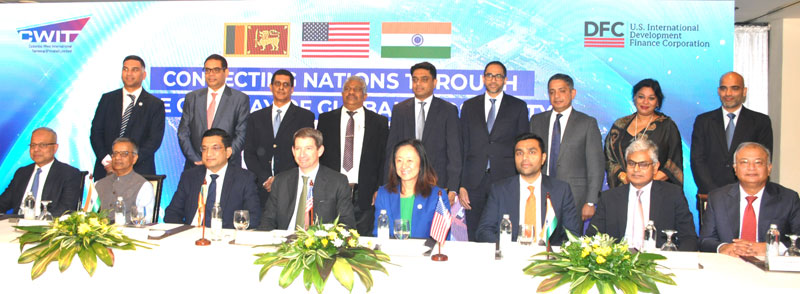The United States yesterday signified its biggest boost for Sri Lanka’s hub status for shipping in the Indian ocean with its International Development Finance Corporation (DFC) committing a 20 year financing worth $ 553 million to upcoming Colombo West International Terminal (CWIT) by a joint venture involving Indian giant Adani, Sri Lanka’s top blue chip John Keells Holdings and the Sri Lanka Ports Authority.
Given the historic significance and importance of the support from a regional and Sri Lanka’s perspective, US Ambassador Julie Chung, Indian High Commissioner Gopal Bagley, Sri Lanka’s Foreign Affairs Minister Ali Sabry and President’s Chief of Staff and National Security Advisor Sagala Ratnayake witnessed the agreement signing yesterday in Colombo between the parties.
Analysts told the Daily FT that given the 20 year tenor, the financing for the entirety of the debt component of CWIT is favourable. It also comes at a time when Sri Lanka remains a default-Sovereign and low grade credit rating. The CWIT costs $ 750 million and the balance is funded by equity.
DFC said its commitment of over half a billion US Dollars to support the development of a deep-water shipping container terminal in the Port of Colombo, will provide critical infrastructure for the South Asian region.
The new terminal reflects DFC’s commitment to financing high-quality infrastructure that supports its partner’s development needs, invests in local communities, and is respectful of local financial conditions. The investment further demonstrates the US enduring commitment to Sri Lanka’s economic growth and its regional economic integration, including with India.
When commissioned, CWIT will be the largest and deepest container terminal in Sri Lanka. With a quay length of 1,400 m and an alongside-depth of 20 m, CWIT will be equipped to handle ultra large container vessels with capacities of 24,000 TEUs. The new terminal’s annual cargo handling capacity is likely to exceed 3.2 million TEUs. Last year the Colombo Port handled nearly 8 million TEUs.
DFC, the US government’s development finance institution, partners with the private sector to finance solutions to the most critical challenges facing the developing world. It invests across sectors, including energy, healthcare, infrastructure, agriculture and small business and financial services.
DFC CEO Scott Nathan said, “DFC works to drive private-sector investments that advance development and economic growth while strengthening the strategic positions of our partners. That’s what we’re delivering with this infrastructure investment in the Port of Colombo.”
“Sri Lanka is one of the world’s key transit hubs, with half of all container ships transiting through its waters. DFC’s commitment of $ 553 million in private-sector loans for the West Container Terminal will expand its shipping capacity, creating greater prosperity for Sri Lanka, without adding to sovereign debt, while at the same time strengthening the position of our allies across the region,” Nathan added.
US Ambassador to Sri Lanka Julie Chung said, “The $ 553 million investment by DFC for the long-term development of the Port of Colombo’s West Container Terminal will facilitate private-sector-led growth in Sri Lanka and attract crucial foreign exchange inflows during its economic recovery. This financing is symbolic of the US long-standing commitment to the development and well-being of the people of Sri Lanka. Sri Lanka regaining its economic footing will further our shared vision for a free and prosperous Indo-Pacific.”
The US sentiments were in apparent response to China whose state-owned entities manage and majority own the biggest and most modern terminal (CICT) in the Colombo Port and the Hambantota International Port in deep-south of Sri Lanka.
Adani Ports and SEZ Ltd, is India’s largest port operator whilst JKH already operates Sri Lanka’s first ever private sector owned and managed terminal South Asia Gateway Terminal Ltd.
This is the first time that the US Government, through one of its agencies, is funding an Adani project, which is a ringing endorsement of the group, Adani said adding, “It shows their confidence in the group’s ability to invest and to create a world class container facility in Colombo Port.”
Adani Ports and Special Economic Zone CEO Karan Adani said, “We welcome the association of the US International Development Finance Corporation (DFC), the US government’s development finance institution, in funding the Adani project, and we see this as a reaffirmation by the international community of our vision, our capabilities and our governance.”
”As one of the world’s largest port developers and operators, APSEZ brings to this project not only our proven world-class expertise but also our deep experience in infrastructure creation. When completed, Colombo West International Terminal project will transform the socio-economic landscape, not just in Colombo but across the Island, through thousands of direct and indirect new employment opportunities and by massively boosting Sri Lanka’s trade and commerce ecosystem.”
JKH Chairperson Krishan Balendra said, “DFC’s investment is an endorsement of the potential of the West Terminal project and a boost for investor confidence as Sri Lanka’s economy recovers”.
The Port of Colombo is the largest and busiest transhipment port in the Indian Ocean. It has been operating at more than 90% utilisation since 2021, signalling its need for additional capacity. The new terminal will cater to growing economies in the Bay of Bengal, taking advantage of Sri Lanka’s prime position on major shipping routes and its proximity to these expanding markets.
The Adani group said it is expanding its global footprint through strategic investments in emerging markets. Adani Ports has positioned itself as the market leader in the transport logistics and energy utility portfolio businesses, focusing on large scale infrastructure development in India with operations and management practices benchmarked to global standards. Through its continued commitment to creating stellar and sustainable assets, the group is playing a vital role in building a better future for India and the world.


